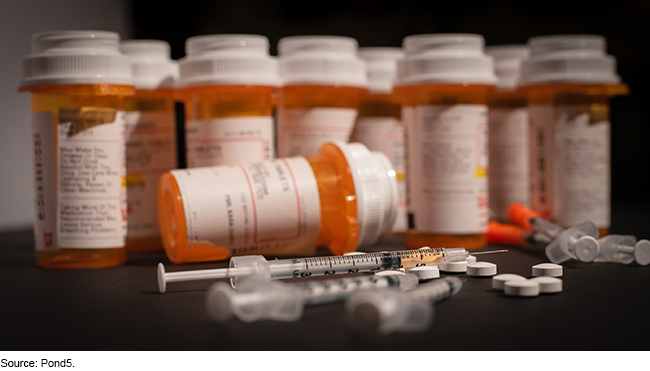Public Health Preparedness: HHS Has Taken Some Steps to Implement New Authority to Speed Medical Countermeasure Innovation
Fast Facts
The COVID-19 pandemic and other infectious disease outbreaks have raised concern about the nation's ability to prevent, respond to, or mitigate potential public health emergencies.
Congress allowed the Department of Health and Human Services (HHS) to partner with a private, nonprofit entity to work on this problem. The nonprofit can use venture capital practices to invest in companies developing promising, innovative medical countermeasures (i.e., drugs, vaccines, and devices to prevent or address potential threats).
HHS has developed preliminary plans for structuring and overseeing the partnership but had not chosen a partner as of July 2020.

Highlights
What GAO Found
The Department of Health and Human Services' (HHS) Biomedical Advanced Research and Development Authority has taken steps towards implementing an authority provided by the 21st Century Cures Act to accelerate the development of medical countermeasures. Medical countermeasures are drugs, vaccines, and devices to diagnose, treat, prevent, or mitigate potential health effects of exposure to chemical, biological, radiological, and nuclear threats. However, as of June 2020, HHS had not selected a medical countermeasures innovation partner—an independent, nonprofit entity that the 21st Century Cures Act authorizes HHS to partner with to use venture capital practices and methods to invest in companies developing medical countermeasures. Towards implementing the authority, HHS has
- developed a vision for the innovation partner,
- staffed a division to manage HHS's medical innovation partnership and determined an initial amount of funding needed,
- solicited and considered feedback from venture capital and other stakeholders, and
- developed preliminary plans for structuring and overseeing the partnership.
HHS officials explained this type of partnership approach was new to the agency and required due diligence to develop. According to agency officials, the innovation partner will allow HHS to invest in potentially transformative medical countermeasures that have the potential to benefit the government. For example, the innovation partner could invest in innovative wearable technologies to help early detection of viral infections. HHS officials told GAO that the partner, which is required by law to be a nonprofit entity, will be required to reinvest BARDA's revenues generated from government investments into further investments made through the partnership. BARDA's ultimate goal will be to use these revenues to fund new investments.
According to a review of stakeholder comments submitted to HHS, potential venture capital partners identified concerns regarding aspects of the agency's plans for the innovation partner, which the stakeholders indicated could hinder HHS's implementation of the authority. For example, there is a statutory limit to the annual salary that can be paid to an individual from HHS's annual appropriation, which some stakeholders indicated was too low to attract an entity to manage the innovation partner funds. HHS officials told GAO they are assessing options to mitigate some of these concerns, but that plans will not be final until they select the partner.
GAO provided a draft of this correspondence to HHS and the Department of Defense for review and comment. HHS did not provide comments on this report and DOD provided technical comments that we incorporated as appropriate.
Why GAO Did This Study
The COVID-19 pandemic and other public health emergencies caused by chemical, biological, radiological, and nuclear agents or emerging infectious diseases raise concern about the nation's vulnerability to, and capacity to prevent or mitigate, potential health effects from exposure to such threats. The 21st Century Cures Act authorized HHS to partner with a private, nonprofit entity that can use venture capital practices and methods to invest in companies developing promising, innovative, medical countermeasures. The 21st Century Cures Act included a provision for GAO to review activities conducted under the innovation partner authority.
This report describes the status of HHS's implementation of the authority. GAO reviewed relevant statutes and HHS documentation regarding its plans and actions taken to implement the authority, reviewed responses HHS received to the two requests for information it used to collect information from venture capital and other stakeholders, interviewed HHS officials, and interviewed officials from the Department of Defense, which has partnered with a private, nonprofit entity to make investments using venture capital practices.
For more information, contact Mary Denigan-Macauley at (202) 512-7114 or DeniganMacauleyM@gao.gov.
